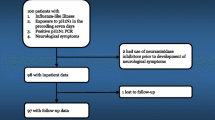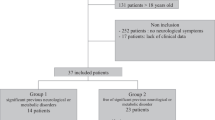Abstract
Objective
Mild encephalopathy with reversible splenial lesion (MERS) is associated with a variety of infections and anti-epileptic drug withdrawal. Here we report the clinical characteristics of H1N1 influenza A-associated MERS based on our experience of four pediatric cases.
Methods
A detailed retrospective analysis of four patients with H1N1 influenza A-associated MERS was performed at Guangzhou Women and Children’s Medical Center.
Results
All patients exhibited mild influenza-like illness and seizures. Three patients presented with a new-onset seizure with fever after 5 years of age. 75% patients had altered mental status. For all four patients, influenza A (H1N1) viral RNA was detected in throat swab specimens at least twice. Brain magnetic resonance images revealed similar ovoid lesions in the corpus callosum, mainly in the splenium and for one patient in the splenium and genu of the corpus callosum. Only one patient had an abnormal electroencephalogram tracing. Cells and protein in the cerebrospinal fluid were normal in all patients. All patients received oseltamivir and one patient received intravenous immunoglobulin. As a result, all patients fully recovered after 2 months and showed no neurologic sequelae at discharge.
Conclusion
This case series provides insight towards clinical features of H1N1 influenza A-associated MERS.
Similar content being viewed by others
References
Garcia-Monco JC, Cortina IE, Ferreira E, et al. Reversible splenial lesion syndrome (RESLES): what’s in a name? J Neuroimaging, 2011,21(2):e1–14
Takanashi J, Barkovich AJ, Yamaguchi K, et al. Influenza-associated encephalitis/encephalopathy with a reversible lesion in the splenium of the corpus callosum: a case report and literature review. AJNR Am J Neuroradiol, 2004,25(5):798–802
Yuan ZF, Shen J, Mao SS, et al. Clinically mild encephalitis/encephalopathy with a reversible splenial lesion associated with Mycoplasma pneumoniae infection. BMC Infect Dis, 2016,16(1):230–235
Souhrada JF, Cherniack RM. Mild Encephalitis/Encephalopathy with Reversible Splenial Lesion (MERS) due to Cytomegalovirus: Case Report and Review of the Literature. Neuropediatrics, 2018,49(1):68–71
Avcu G, Kilinc MA, Eraslan C, et al. Mild encephalitis/encephalopathy with reversible splenial lesion (MERS) associated with Streptococcus pneumoniae Bacteraemia. J Infect Public Health, 2017,10(4):479–482
Ko SY, Kim B K, Kim DW, et al. Reversible splenial lesion on the corpus callosum in nonfulminant hepatitis A presenting as encephalopathy. Clin Mol Hepatol, 2014,20(4):398–401
Jinnai A, Kikuchi T, Ishikawa M, et al. A case of rubella encephalitis presenting as clinically mild encephalitis/encephalopathy with a reversible splenial lesion. Rinsho Shinkeigaku (Japenese), 2014,54(8):668–670
Tada H, Takanashi J, Barkovich AJ, et al. Clinically mild encephalitis/encephalopathy with a reversible splenial lesion. Neurology, 2004,63:1854–1858
Bulakbasi N. Transient splenial lesion of the corpus callosum in clinically mild influenza-associated encephalitis/encephalopathy. AJNR Am J Neuroradiol, 2006,27(9):1983–1986
Iwata A, Matsubara K, Nigami H, et al. Reversible Splenial Lesion Associated With Novel Influenza A (H1N1) Viral Infection. Pediatr Neurol, 2010,42(6):447–450
Akins PT, Belko J, Uyeki TM, et al. H1N1 Encephalitis with Malignant Edema and Review of Neurologic Complications from Influenza. Neurocrit Care, 2010, 13(3):396–406
Centers for Disease Control and Prevention (CDC). Neurologic complications associated with novel influenza A (H1N1) virus infection in children — Dallas, Texas, May 2009. MMWR Morb Mortal Wkly Rep, 2009,58(28):773–778
Chen WX, Liu HS, Yang SD, et al. Reversible splenial lesion syndrome in children: Retrospective study and summary of case series. Brain Dev, 2016,38(10):915–927
Tsuji M, Yoshida T, Miyakoshi C, et al. Is a Reversible Splenial Lesion a Sign of Encephalopathy? Pediatric Neurology, 2009,41(2):143–145
Rachel C, Toni W, James S, et al. Benign Post-Partum Reversible Restricted Diffusion Lesion of the Splenium. Can J Neurol Sci, 2013,40(1):89–90
Matsubara K, Kodera M, Nigami H, et al. Reversible Splenial Lesion in Influenza Virus Encephalopathy. Pediat Neurol, 2007,37(6):431–434
Takanashi J, Imamura A, Hayakawa F, et al. Differences in the time course of splenial and white matter lesions in clinically mild encephalitis/encephalopathy with a reversible splenial lesion (MERS). J Neurol Sci, 2010,292:24–27
Author information
Authors and Affiliations
Corresponding author
Ethics declarations
The authors declare that there is no conflict of interest with any financial organization or corporation or individual that can inappropriately influence this work.
Additional information
This work was supported by the Medical Scientific Research Foundation of Guangdong Province of China (No. A2020502).
Rights and permissions
About this article
Cite this article
Li, Xf., Ai, B., Ye, Jw. et al. Clinical Characteristics of H1N1 Influenza A-Associated Mild Encephalopathy with Reversible Splenial Lesion: 4 Pediatric Cases. CURR MED SCI 41, 815–820 (2021). https://doi.org/10.1007/s11596-021-2408-0
Received:
Accepted:
Published:
Issue Date:
DOI: https://doi.org/10.1007/s11596-021-2408-0




